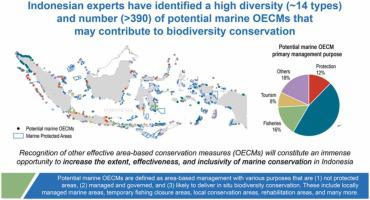Marine Policy ( IF 3.5 ) Pub Date : 2022-01-15 , DOI: 10.1016/j.marpol.2021.104939 Estradivari 1, 2, 3 , Muh. Firdaus Agung 4 , Dedi Supriadi Adhuri 5 , Sebastian C.A. Ferse 2, 6 , Ita Sualia 7 , Dominic A. Andradi-Brown 8 , Stuart J. Campbell 9 , Mohamad Iqbal 3 , Harry D. Jonas 10 , Muhammad Erdi Lazuardi 3 , Hellen Nanlohy 11 , Fitryanti Pakiding 12 , Ni Kadek Sri Pusparini 13 , Hikmah C. Ramadhana 3 , Toni Ruchimat 14 , I Wayan Veda Santiadji 15 , Natelda R. Timisela 16 , Laura Veverka 8 , Gabby N. Ahmadia 8

|
In a marine environment that is rapidly changing due to anthropogenic activities and climate change, area-based management tools are often used to mitigate threats and conserve biodiversity. Marine protected areas (MPAs) are amongst the most widespread and recognized marine conservation tools worldwide, however, MPAs alone are inadequate to address the environmental crisis. The promotion of other effective area-based conservation measures (OECMs) under draft Target 3 of the Post-2020 Global Biodiversity Framework, i.e., conserving 30% of marine areas by 2030, holds promise to acknowledge sites and practices occurring beyond MPAs that contribute to conservation. Here, we evaluate the potential recognition of OECMs into Indonesia's national policy framework on marine resource management and provide the first-ever overview of distribution and types of potential marine OECMs in Indonesia, including a review of the existing evidence on conservation effectiveness. We identified > 390 potential marine OECMs, led by government, customary and local communities, or the private sector, towards diverse management objectives, including habitat protection, traditional/customary management, fisheries, tourism, or other purposes. While some evidence exists regarding the conservation effectiveness of these practices, the long-term impacts on biodiversity of all potential marine OECMs in Indonesia are unknown. Many OECM elements have been included in several national policies, yet there are no established mechanisms to identify, recognize and report sites as OECMs in Indonesia. We propose four transformational strategies for future OECM recognition in Indonesia, namely: (i) safeguard customary and traditional communities, (ii) leverage cross-sector and cross-scale collaboration, (iii) focus on delivering outcomes, and (iv) streamline legal frameworks. Our study shows that OECMs have the potential to play a significant role in underpinning marine area-based conservation in Indonesia, including supporting the Government of Indonesia in reaching national and international conservation targets and goals.
中文翻译:

海洋保护区以外的海洋保护:在印度尼西亚承认其他有效的基于区域的保护措施(OECMs)
在由于人为活动和气候变化而迅速变化的海洋环境中,基于区域的管理工具通常用于减轻威胁和保护生物多样性。海洋保护区 (MPA) 是世界范围内最广泛和公认的海洋保护工具之一,然而,仅 MPA 不足以应对环境危机。在 2020 年后全球生物多样性框架目标 3 草案下推广其他有效的基于区域的保护措施 (OECM),即到 2030 年保护 30% 的海洋区域,有望承认海洋保护区以外发生的有助于保护。在这里,我们评估了 OECM 在印度尼西亚的潜在认可度。s 有关海洋资源管理的国家政策框架,并首次概述了印度尼西亚潜在海洋 OECM 的分布和类型,包括对有关保护有效性的现有证据的审查。我们确定了超过 390 个潜在的海洋 OECM,由政府、传统和当地社区或私营部门领导,以实现多样化的管理目标,包括栖息地保护、传统/习惯管理、渔业、旅游或其他目的。虽然存在一些关于这些做法的保护有效性的证据,但印度尼西亚所有潜在海洋 OECM 对生物多样性的长期影响尚不清楚。许多 OECM 要素已包含在若干国家政策中,但在印度尼西亚尚无确定、识别和报告场所为 OECM 的既定机制。我们为印度尼西亚未来的 OECM 认可提出了四项转型战略,即:(i) 保护传统和传统社区,(ii) 利用跨部门和跨规模合作,(iii) 专注于交付成果,以及 (iv) 简化法律构架。我们的研究表明,OECM 有可能在支持印度尼西亚的海洋区域保护方面发挥重要作用,包括支持印度尼西亚政府实现国家和国际保护目标和目标。











































 京公网安备 11010802027423号
京公网安备 11010802027423号